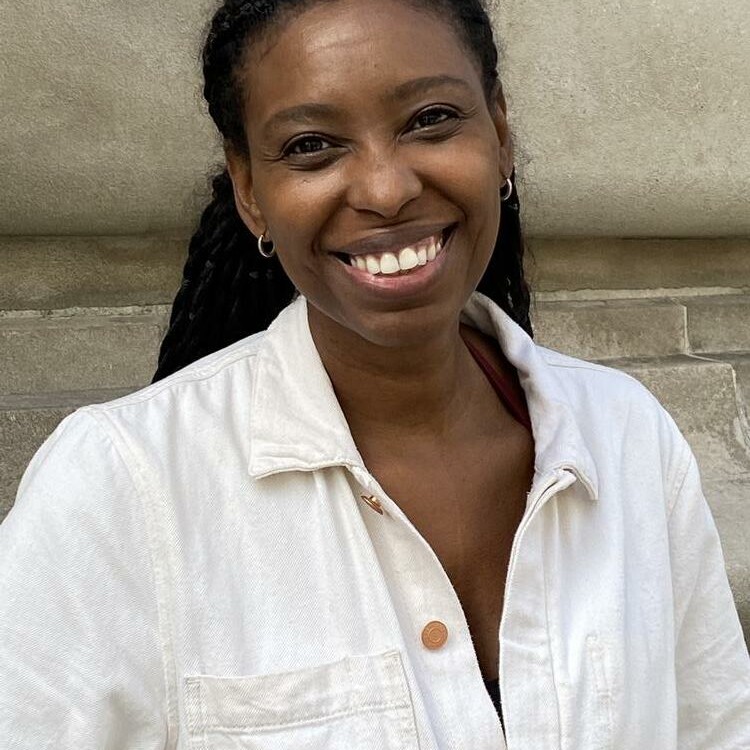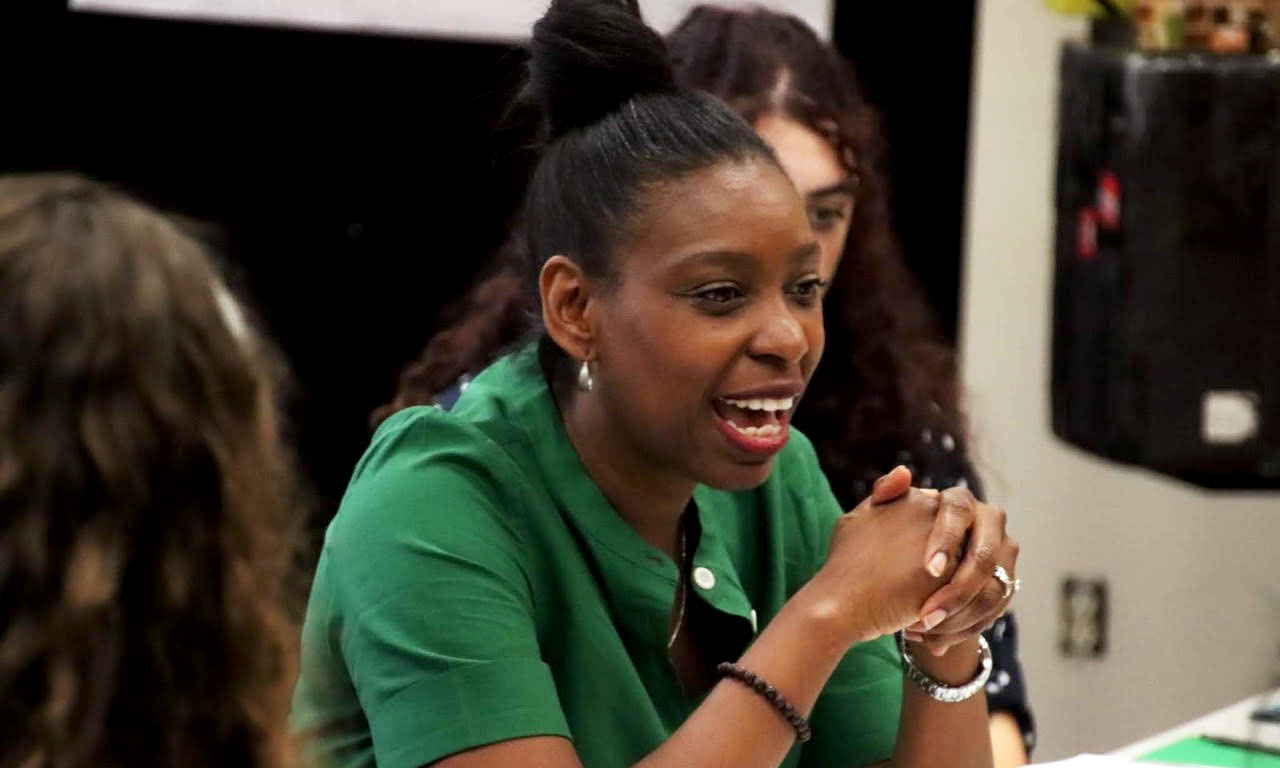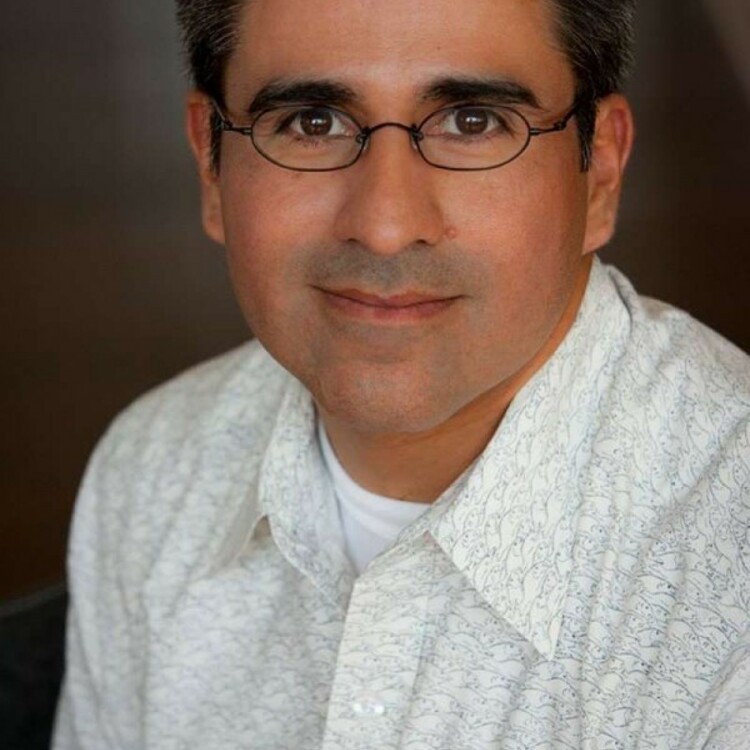I make theatre because I believe theatre breeds empathy and empathy is the power to annihilate the stranger, making neighbors of us all. But I am just barely holding on to a lifelong romantic notion that the theatre I make can sorta-kinda-maybe make change (one human at least, perhaps at each performance?). These are modest returns to hope for given the dire circumstances, but it’s all I got because I somehow still insist that I make theatre.
I make believe. I make escapes from the present moment in order to recall the past. I also make worlds that don’t exist… yet.
And is this perverse? Why don’t we just close down these factories of make-believe and give all the money, time, and effort to more tangible salves and solves like fair housing, voting rights, and lawmaking that really forward those lofty American ideals of equality, freedom, and the pursuit of happiness for all? Why in the world do I insist on making theatre?
Maybe it’s because it’s the tool I know how to use most proficiently, even as I practice with the rest. And am I, in continuing to make theatre, complicit in the racial, cultural, and gender-biased systems that are perpetuated in every facet of this field? Still, I make theatre and I have to change how I make theatre. Even as the “why” remains the same.
I make theatre and I have to change how I make theatre. Even as the “why” remains the same.
In late March, as the realities of COVID-19 were manifesting across the United States and theatres in New York were closed, I was in the middle of scheduling conversations with theatremakers for a residency opportunity. Our conversations quickly turned to festering doubts about the value of being an artist in a time of shut-down theatres, no public gatherings, a deepening sense of isolation, growing unrest, and blinding inequity laid bare against the backdrop of essential workers who had previously been invisible workers. We were in mourning and none of us could fully articulate for what.
But still, I’d found these gatherings nourishing, so when I first joined Working Theater in New York City as co–artistic director just a couple of weeks later, I asked artists to talk with me and share their vision for what the theatre should be post pandemic. These were theatremakers and community members I admired, respected, were challenged by, and whose work mystified me, comforted me, awakened me, and terrified me. Theatre was supposedly on “pause” and there seemed to be a tiny sliver of time available for reflection. Sixty artists agreed to conversations with me and my co-artistic director, Mark Plesent. There is something in the act of stopping that allows for a deeper assessment, not just of what someone is doing but what they should be doing. These conversations took place before the murder of George Floyd, but the deep mourning and unrest was already there, just below the surface. Personally, I was struggling to reframe the intense feelings of sadness and rage that Black and Brown bodies were, once again, the ones mostly on the front lines. I was struggling with vision. I was struggling to be hopeful. I was struggling to see beyond this inflection point.
The pot finally boiled over and a global pandemic met a national reckoning on 25 May. And all of this—the mourning, the sense of betrayal, the sadness and rage—crystallized. The desire to resist a return to the devastating dysfunction of “normal” that had quietly begun to be articulated was now on full blast, amplified by the notion that what was tolerated before could no longer be stomached. The question that echoed in my brain was, “How do we catch this moment and create a real revolution?” Or, more precisely, evolution, because, truly, none of us had quite been here before. It was the time to finally shake ourselves loose from what was and activate our imaginations towards what could be, should be, must be.
But I make theatre.
For the first time in my life, I felt unable to pierce the void in front of me in order to see what could be. My imagination was broken. In the words of Afrosurrealism manifesto author D. Scott Miller, I was experiencing the “absurdity of Black life being lived in real time… It’s hard to see with so much blood in your eyes.”
I was struggling to hold on to my beliefs that theatre was an action, not a place; that through the action of collective envisioning—the “suspension of disbelief”—theatre was an exceptional tool for change and healing. My entire life, I have equated freedom with imagination. And yet I simply could not activate my imagination beyond the unremitting, exhausting, soul-crushing present. Running out of imagination is like running out of faith, hope, energy, and goodwill.
But I was happy to have had those April conversations with artists, people whose jobs were to bring forth new worlds from blank pages and dark rooms; people who engaged in “what if” daily. I had asked them to talk about what stories needed to be told right now, what stories they longed to tell, what they wanted the theatre to be when it reopens. I have turned back to these conversations, full of “what ifs,” to wake my imagination again.
I was struggling to hold on to my beliefs that theatre was an action, not a place; that through the action of collective envisioning—the “suspension of disbelief”—theatre was an exceptional tool for change and healing.
What if we thought of theatre as community organizing?
Through the tools of storytelling and myth-breaking we can draw people together in new relationships around shared interests for mutual benefit. That is the definition of community organizing. What if each piece of creation is examined for its effectiveness at creating meaningful dialogue between groups of “us” and groups of “them,” towards new experiences of each other that broaden a community’s ability to act in empathetic ways and that humanize the “other”? What if, for our artists, our theatres were communities of resources and support rather than scarcity and competition? What if we recognized that scarcity is a myth perpetuated to create competition, which only deepens the divide? What if we actually believed there was enough for everyone?
What if we called our theatres service organizations rather than cultural institutions?
I think of organizations as entities, with the potential to bring people together for (right) actions, and service organizations offer assistance and service to those in need—they help people bring people together. On the other hand, I think of institutions as places that keep people out, that are associated with permanence, enforcement, and destructive systems of exclusion. And cultural institutions elevate and safeguard one group’s culture—often defined by class as much as race—to the exclusion of everyone else who might want to belong.
What if we asked our artists, “What do you need and how can we be of service to you?”
… And if we didn’t assume one artist’s answer is the panacea for every artist. What if we asked people in the neighborhoods and communities where our theatres reside the same questions and we didn’t assume that we are, indeed, needed, wanted, or even of value because, after all, we haven’t yet proven our worth. What if we remembered that service is sometimes opening our lobbies to provide a cool, safe place to rest in the middle of a protest, or transforming our stages into distribution centers for food, clothing, books, and school supplies because that is also what the neighborhood needs. (Thank you, organizations like Jack, New York Theatre Workshop, and BRIC, to name only a few, who have recently made this “what if” into a “let’s do it.”)
What if we thought of theatre as medicine?
And before we administered the cure we first asked, “Where does it hurt?” For those of us who have experienced the healing power of laughter and the cathartic potential in the communal release of tears, we know how good it feels when someone lays hands on our trauma, recognizing the damage and reinforcing our humanity. What if, by giving voice and release to what ails us, we were able to quell the pain?
What if we thought of our artists as healers?
And we acknowledged our storytellers for the healing powers they administer and the knowledge they keep? They speak truths out loud, exposing the damp corners of nostalgia and the silences bred in fear. They are light bearers, truth seekers, and shamans who tell us what we aren’t prepared to hear and invite us to a future we haven’t dared to imagine. But too often we treat artists as poorly paid day laborers who should be grateful for the chance to make work for the likes of us and our institutions. We could start by paying our artists a weekly living wage, from engagement to implementation, with covered childcare and welcoming parenting environments, offer five-day work weeks, and abolish twelve-hour techs. (Shout out to Playwrights Realm, Baltimore Center Stage, and the others who have been doing some of this already.)
What if we discarded the stale rituals of sitting in hushed darkness? What if we kept the lights on so we could all remember that we are in the same story together?
What if we took away the doors to our theatres?
Or, for gods’ sake, at least opened them more widely and maybe even raised the curtains on the windows to let the light in. What if we meant it when we say “Come as you are?” What if we only required of our audiences their power to be present with us and nothing else? What if we discarded the stale rituals of sitting in hushed darkness? What if we kept the lights on so we could all remember that we are in the same story together? What if we truly considered the actual effort it takes for some people just to get to a theatre? What if we accepted that liveness may not require physical presence? What if we made it easier for people with differing abilities, challenged physical mobilities, and limited economic abilities to experience theatre because we believe it is important to have artists and audiences who represent the full spectrum of our communities present when we gather?
What if audiences were asked to pay at the end of the performance instead of before?
That way, they could assess for themselves the value of their experience, time, and effort? Or, what if we asked audiences to pay on a sliding scale based on their income? If someone is below the poverty line, theatre is free. If they’re in the top 20 percent of income earners, they pay for their ticket and half of someone else’s. If they’re in the top 1 percent, they pay for their ticket and subsidize two others.
While we’re at it, can we acknowledge that access is not just an issue of marginalized audiences but also about marginalized artists? Can we please stop talking about a pipeline that only presupposes a fixed access point, moving in a rigid direction, which offers limited resources and a narrow conduit to success? It’s the same as having a “seat at the table.” Let’s take away the table, which is limited real estate. Instead, we can gather in an infinitely widening circle.
I make theatre because it is an infinite circle, a continuous call and response, a myth-making and myth-breaking apparatus, all at the same time. It is invention, make-believe, and truth. The theatre is where we can dismantle harmful ideologies born out of fear, where we can frame stories anew, built out of generosity and abundance. It is futurism in the flesh. It is a space of criticism, unmasking, and radical imagination. It is also a place of bounty.
I understand that the theatre may not save us. But those artists I spoke to earlier this year reminded me that imagination most certainly will. As we all bend towards liberation and away from old ideologies and destructive systems, I am reminded that we have practiced creating whole worlds on blank pages (and in dark rooms, which we will henceforth be light). It is for us to say who we are and who we should be. For us to say what we will stand for and what we will not. As one artist said to me, “If it’s not built out of love, compassion, empathy, I’m not interested.”
I don’t make laws. I barely make rules. But I do make theatre.




Comments
The article is just the start of the conversation—we want to know what you think about this subject, too! HowlRound is a space for knowledge-sharing, and we welcome spirited, thoughtful, and on-topic dialogue. Find our full comments policy here
Given recent events and crises in our country, this essay helped me connect again with my own mission of how I want to practice theatre. Thank you, Ms. Woodard. for sending these questions out to the community.
What a stirring essay! Fundamental, thought-provoking questions here. Too often, I think, theater artists and theater institutions lose touch with the experience of Audiences. The insights, passion, and questions in this essay seem to me a terrific inspiration for people reconsidering and/or remaking our theaters' collaborations with artists and audiences.